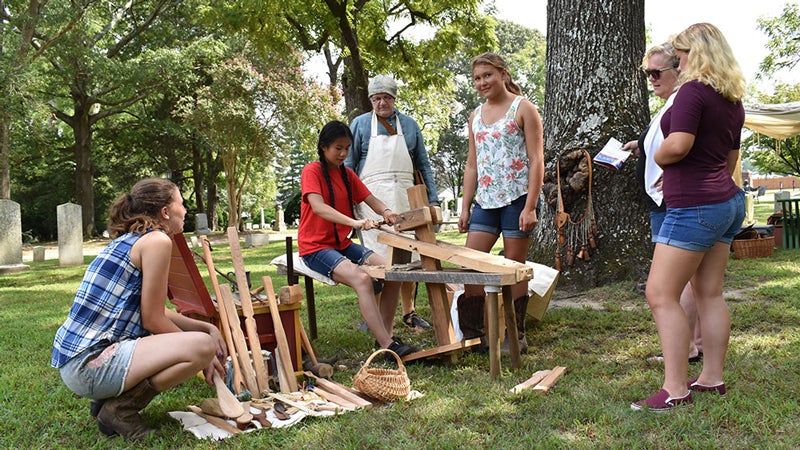Weekend at St. Luke’s to highlight ‘religion and race,’ origin of vaccines
Published 11:53 pm Tuesday, August 1, 2023

- Spectators observe 17th century crafting during one of St. Luke's Historic Church & Museum's past "living history" weekends. (File photo)
Nearly 300 years before the COVID-19 pandemic, someone attached a note to a bomb and tossed the explosive into the home of the Rev. Cotton Mather.
“I’l (sic) inoculate you with this; with a pox to you,” the note read, as transcribed with an account of the incident in a National Institutes of Health publication.
This year’s “living history” weekend at St. Luke’s Historic Church and Museum will include an inside look at the colonial origins of two modern-day topics: vaccines and the role religion and law played in shaping America’s concept of race.
Mather is credited with introducing a controversial procedure known as inoculation to Boston at the height of the 1721 smallpox epidemic, writing in his diary he’d learned of the technique from an enslaved African named Onesimus. Unlike most modern vaccines, the colonial procedure entailed using a small amount of live virus to deliberately expose healthy people in hopes of creating a milder infection from which they could recover and build immunity.
On Sept. 9 at 1 p.m., historian Tony Williams, a senior teaching fellow at the Bill of Rights Institute and the author of six books on the early American republic, will host a lecture at St. Luke’s on Boston’s smallpox epidemic and debate over inoculation.
At 2 p.m. on Sept. 9, Cassandra Newby-Alexander, an endowed professor of Virginia Black history and culture at Norfolk State University, will present a lecture titled “Race and Religion in Early Virginia,” which will focus on how the Church of England played a role in the development of Virginia’s “slave codes” and modern ideas of race.
On Sept. 9 at 4 p.m., The Locrian Consort will present a concert of 17th century music while vendors and reenactors will visit the church grounds.
On Sept. 10 at 11 a.m. museum educator Emily Haney will show St. Luke’s collection of recently acquired 17th century artifacts.
At 1 p.m. on Sept. 10, St. Luke’s education coordinator John Ericson will present a lecture on how the European wars of the protestant reformation influenced political philosophy and the ideals of religious freedom.
All events are free but registration is required. There is a limit of 25 people for Haney’s presentation.
To register for Williams’ presentation, visit: https://stlukesmuseum.org/events/17th-century-lecture-1-from-the-old-covenant-to-the-new-smallpox-inoculation-and-the-puritans/
To register for Newby-Alexander’s presentation, visit: https://stlukesmuseum.org/events/17th-century-lecture-3-race-and-religion-in-early-virginia-how-did-the-established-church-of-england-play-a-significant-role-in-the-development-of-virginia-slave-codes-and-the-modern-concept-of/
To register for the concert, visit: https://stlukesmuseum.org/events/17th-century-concert-by-the-locrian-consort/
To register for Ericson’s presentation, visit: https://stlukesmuseum.org/events/17th-century-lecture-2-from-religious-wars-to-religious-freedom-how-the-european-wars-of-the-reformation-influenced-political-philosophy-and-the-ideals-of-religious-freedom/





